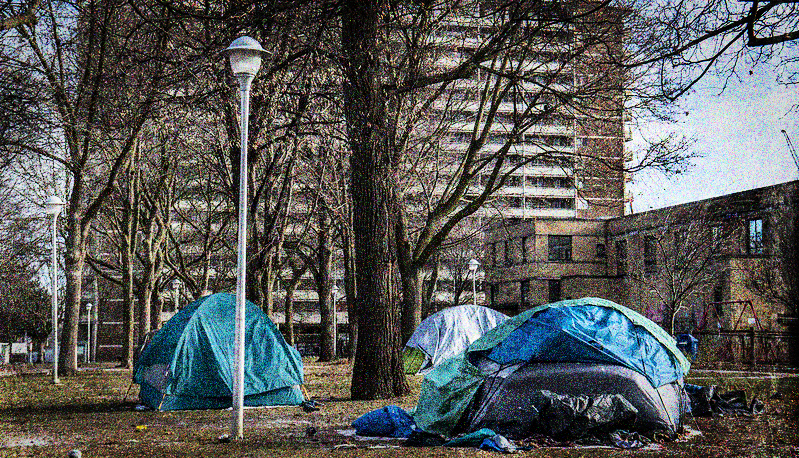
A recent report from the Canadian Centre for Policy Alternatives finds that the cost of a one-bedroom apartment exceeds what minimum-wage workers can afford in nearly all of Canada’s urban centres. Across the country, the ruling class has proven itself to be utterly incapable of providing adequate housing for its workers.
Between low wages and extortionate rents
In response to sky-high rental prices in Toronto, Vancouver, Montreal, and other major centres, right-wing politicians and media outlets are fond of advising workers to move. Supposedly, while big cities may not be affordable, other cities surely must be.
In reality, however, a casual look at rental costs across the country reveals the “housing crisis” to be effectively unavoidable.
Canada’s average rent hit a record high of $2,078 per month in July—roughly 60 per cent of the median Canadian monthly salary. But beyond the average, the rental crisis is visible in nearly every one of Canada’s cities and “metropolitan areas” individually. Across the country, headlines abound of workers who are forced to rent basements, closets, porches, garages, and hallways, while thousands of others are forced onto the streets.
The CCPA report reveals that nearly everywhere in the country, from British Columbia to the Maritimes, the “rental wage”—the hourly wage that a full-time worker would need to securely afford a one-bedroom apartment—exceeds the minimum wage.
British Columbia, for example, has one of the highest minimum wages at $16.75 per hour. But across the province, the rental wage averages $27.54 per hour, and up to $32.36 per hour in Vancouver. In Alberta, where the minimum wage is $15, the rental wage averages $21.42 per hour—ranging from $19.62 per hour in Lethbridge to $24.65 in Calgary.
Saskatchewan has the country’s lowest minimum wage at $13 per hour, but the province’s landlords still charge an average of $18.62 per hour for a one-bedroom.
In Ontario, Canada’s most populous province, minimum wage workers earn $15.50 per hour—against an average rental wage of $25.96 per hour. That ranges from over $30 per hour in Toronto to $23.02 in Hamilton.
In fact only three urban areas in the country have a rental wage lower than the local minimum wage: Sherbrooke, Trois-Rivières, and Saguenay. Combined, it should be noted, these three Quebec cities have a population of fewer than 500,000 people. Moreover, in most of Quebec’s other urban areas, the rental cost exceeds the province’s $14.25 minimum wage—ranging from $18 per hour in Montreal to $16.77 in Quebec city to $18.43 in Gatineau. There is no fleeing the housing crisis.
No solution under capitalism
The law of supply and demand is often cited to explain high rents. Rents are rising, even as wages stagnate, supposedly because there just isn’t enough housing. And, we are told, rents will continue to rise until the housing supply increases accordingly.
But despite rising rents and rising prices, the country’s existing housing supply is not even being used to lower costs.
Across the country, thousands of potential housing units are sitting empty, so speculators can flip them at exorbitant profits. In fact, a whopping 20.2 per cent of properties in Ontario are actually owned by investors, using the property as an investment vehicle. According to Statistics Canada, there were 1.3 million vacant homes in Canada in 2021. Although this number includes secondary residences like vacation homes, this is still a staggering amount.
Elsewhere, the same speculators are purchasing older buildings to demolish them, and replace them with pricier condominiums, evicting lower-income renters in the process, or to “renovict” them, that is evicting tenants under the guise of major renovations to then massively increase rent.
In fact, despite Canada’s massive housing bubble, only nine per cent of the housing units built in the past decade have been “purpose-built rental units,” while condominium development has surged.
There have been calls for the government to “incentivize” the development of purpose-built rental units, mainly with subsidies, in the hopes that this might lower rents. But these “solutions” are nothing more than an attempt to use the housing crisis to justify corporate welfare for developers, and will do nothing to make housing more affordable for workers.
In fact, so long as these units are privately-owned, they will be rented out at the highest rate possible. No matter how many subsidies are poured into “affordable” developments, investment properties will be priced to maximize returns. This is why, for instance, landlords have increasingly converted their units into short-term rentals such as Airbnbs, further exacerbating the shortage of affordable housing.
This is the logic of capitalism. At bottom, landlords and property developers do not exist to provide housing. They exist to reap profits. Their profits come from their monopoly chiefly over the land which surrounds Canada’s major employment and social centres.
Unlike other essential goods, the supply of land is fixed. Land is a natural monopoly, and that allows landowners, whether they are landlords, speculators or developers, to realize what Marx called “ground rent”—ever-steeper profits from their monopoly over a portion of the Earth, no matter how crowded, dangerous or dilapidated the housing units themselves may be. And when they sell those same units, they can often do so at an even greater profit, in anticipation of future price increases and future rent increases.
Expropriate the parasites
There is, it is true, a finite quantity of land available for housing in the country’s urban centres. Land is a limited resource. That is why the working class needs to seize the land and housing supply from the landlords, speculators and developers, and manage it democratically.
The “housing crisis,” is, fundamentally, a capitalist crisis. And the capitalists cannot be trusted to resolve it. They must be overthrown.
A planned economy would end the absurd mismatch between empty housing units and homeless people across the country. It would seize the wealth that is currently being squandered by landlords and speculators in favor of a massive program of housing construction, refurbishment and repair—to provide decent living conditions for all.

